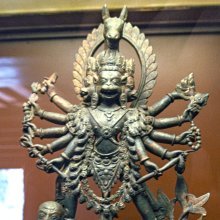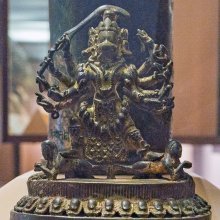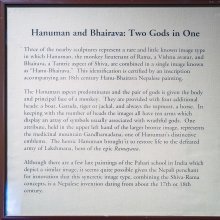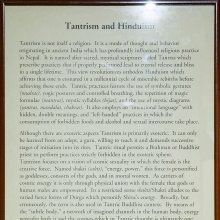Hanu, Hanū: 21 definitions
Introduction:
Hanu means something in Hinduism, Sanskrit, Buddhism, Pali, Marathi, Jainism, Prakrit, Hindi. If you want to know the exact meaning, history, etymology or English translation of this term then check out the descriptions on this page. Add your comment or reference to a book if you want to contribute to this summary article.
Hanu has 21 English definitions available.
Images (photo gallery)
Languages of India and abroad
Sanskrit dictionary
[Deutsch Wörterbuch]
Source: Cologne Digital Sanskrit Dictionaries: Böhtlingk and Roth Grosses Petersburger WörterbuchHanu (हनु):—(von 1. han) [Uṇādisūtra 1, 11.] f.
1) Kinnbacke (nach den Lexicographen auch m.) [Amarakoṣa 2, 6, 2, 41.] [Trikāṇḍaśeṣa 3, 3, 273.] [Hemacandra’s Abhidhānacintāmaṇi 583.] [Anekārthasaṃgraha 2, 292.] [Medinīkoṣa Nalopākhyāna 25. fg.] [Halāyudha 2, 367. 5, 32.] [VARARUCI] bei [UJJVAL.] [Ṛgveda 1, 52, 6. 168, 5. 5, 36, 2.] ti.mā [8, 49, 13.] hanū.vibhṛte.saṃ bharete [10, 79, 1. 152, 3.] [Atharvavedasaṃhitā 6, 56, 3. 10, 9, 13.] hanvo.hi ji.vāmadadhāt [2, 7. 8.] hanū sajihve [Aitareyabrāhmaṇa 7, 11.] pūrvā, aparā [The Śatapathabrāhmaṇa 8, 4, 4, 9.] vṛ.asya [Atharvavedasaṃhitā 19, 47, 9.] [Vājasaneyisaṃhitā 11, 78. 24, 1. 25, 1.] [The Śatapathabrāhmaṇa 1, 2, 1, 17. 13, 2, 2, 4.] [Kāṭhaka-Recension 25, 9.] hanvoḥ prakarṣaṇe [Prātiśākhya zum Ṛgveda 14, 3.] [Taittirīyasaṃhitā] [Prātiśākhya 2, 16.] Comm. zu [23, 2.] calana [Pāṇini’s acht Bücher 3, 1, 15, Vārttika von Kātyāyana.] [Yājñavalkya’s Gesetzbuch 3, 88.] [Mahābhārata 3, 10391. 12, 3748.] [Rāmāyaṇa 5, 3, 53. 6, 4, 17.] [Varāhamihira’s Bṛhajjātaka S. 50, 12. 51, 34. 42. 52, 3. 66, 2] (eines Pferdes). [67, 7] (eines Elephanten). [68, 88.] [Bhāgavatapurāṇa 3, 19, 2. 6, 12, 4.] uttarā, adharā [5, 23, 7. 6, 12, 27.] saṃdhi [Suśruta 1, 305, 12.] mūla [Prātiśākhya zur Vājasaneyisaṃhitā 1, 83.] [Prātiśākha zum Atharvaveda 1, 20.] Comm. zu [28.] oṣṭhahanu n. Lippen und Kinnbacken [Taittirīyasaṃhitā] [Prātiśākhya 2, 12.] Auch hanū [Taittirīyasaṃhitā] [Prātiśākhya 3, 7.] [BHARATA] zu [Amarakoṣa] nach [Śabdakalpadruma] hanūbhyām [Taittirīyasaṃhitā 7, 3, 16, 1.] mūla [Taittirīyasaṃhitā Prātiśākhya 2, 35.] Comm. zu [17.] Am Ende eines adj. comp.: caturhanu [Atharvavedasaṃhitā 5, 19, 7.] mahā (s. auch bes.) [Mahābhārata 3, 2784.] [Rāmāyaṇa 1, 1, 11.] [Bhāgavatapurāṇa 4, 14, 44.] sthūla [Varāhamihira’s Bṛhajjātaka 17, 5.] su (s. auch bes.) [Rāmāyaṇa Gorresio 2, 62, 16.] —
2) n. Backe am Beschlag eines Speers und dgl. [The Śatapathabrāhmaṇa 11, 5, 5, 13.] —
3) Tod und Waffe [Hemacandra’s Anekārthasaṃgraha] [VARAR.] Krankheit [Hemacandra’s Anekārthasaṃgraha] [Medinīkoṣa] [VARAR.] ein best. Parfum, = haṭṭavilāsinī [Amarakoṣa 2, 4, 4, 18.] [Trikāṇḍaśeṣa] [Medinīkoṣa] = vyāghranakha [MAD. 3, 68.] Gelbwurz (haridrā) [Hemacandra’s Anekārthasaṃgraha] = sūnā und vajra [Medinīkoṣa] st. dessen nṛtyārambha [Siddhāntakaumudī.248,b,9] nach ders. Aut. — Vgl. adhara ( [Atharvavedasaṃhitā 9, 7, 2]), ayo, uttara, durhaṇu, nāga, pari, mahā, śveta, saṃ, siṃha, su .
--- OR ---
Hānu (हानु):—m. Zahn [Trikāṇḍaśeṣa 2, 6, 29.] hālu [WILSON] und [Śabdakalpadruma] nach ders. Aut. — Vgl. hānavya .
Sanskrit, also spelled संस्कृतम् (saṃskṛtam), is an ancient language of India commonly seen as the grandmother of the Indo-European language family (even English!). Closely allied with Prakrit and Pali, Sanskrit is more exhaustive in both grammar and terms and has the most extensive collection of literature in the world, greatly surpassing its sister-languages Greek and Latin.
See also (Relevant definitions)
Starts with (+131): Hanu-rei, Hanubheda, Hanudun, Hanugraha, Hanugrahavata, Hanugu, Hanuhanis, Hanuja, Hanuka, Hanukalu, Hanukampa, Hanukisu, Hanuku, Hanula, Hanuma, Hanuma loha, Hanumac, Hanumacchata, Hanumaccitra, Hanumachchitra.
Ends with (+178): Aad-rahanu, Acchanu, Ada-rahanu, Adharahanu, Adhijyadhanu, Agadi-badhanu, Ago-khanu, Ahibhanu, Aimthanu, Akhandaladhanu, Akhanu, Aljhanu, Alu-khanu, Amaradhanu, Amritabhanu, Anaka-jumrale-matrai-khanu, Anubhanu, Anvagbhanu, Arthanu, Arutahanu.
Full-text (+108): Hanugraha, Hanuman, Hanustambha, Hanavya, Hanuka, Candrahanu, Hanumoksha, Hanula, Ayohanu, Nagahanu, Arutahanu, Hanubheda, Hanush, Hanumatkirtana, Hanumatstotra, Hanumatpancanga, Hanumatprabandha, Hanumatsahasranaman, Hanumatpratishtha, Hanumattailavidhi.
Relevant text
Search found 25 books and stories containing Hanu, Haṇū, Hanū, Hānu, Haṇu; (plurals include: Hanus, Haṇūs, Hanūs, Hānus, Haṇus). You can also click to the full overview containing English textual excerpts. Below are direct links for the most relevant articles:
Hanuman Nataka (critical study) (by Nurima Yeasmin)
Part 1: Hanumannāṭaka: Title of the Play < [Chapter 3]
Rig Veda (translation and commentary) (by H. H. Wilson)
Amarakoshodghatana of Kshirasvamin (study) (by A. Yamuna Devi)
Words with special connotations < [Chapter 6 - Grammatical Aspects]
External Anatomy < [Chapter 3 - Social Aspects]
Vishnudharmottara Purana (Art and Architecture) (by Bhagyashree Sarma)
7(a): Portrait of Men and Women < [Chapter 5 - Painting and Image Making]
Taittiriya Upanishad Bhashya Vartika (by R. Balasubramanian)
Verse 1.62 < [Book 1 - Śīkṣāvallī]
Sushruta Samhita, volume 4: Cikitsasthana (by Kaviraj Kunja Lal Bhishagratna)



